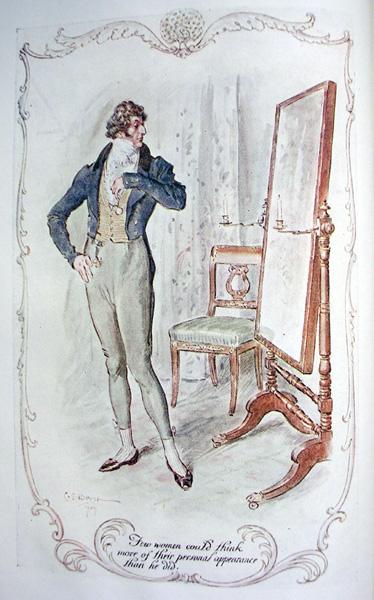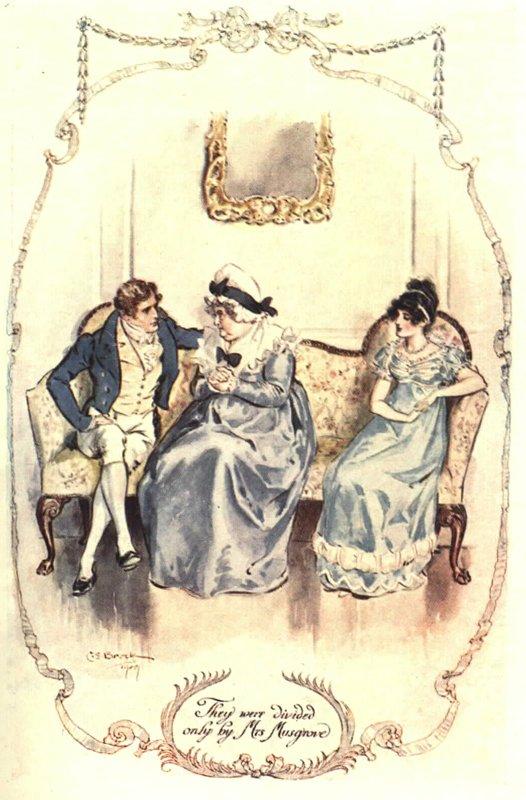
He was only Sir Walter: the opening of Persuasion
By Giulia Magnotti Komatz with illustrations from Persuasion by C.E. Brock
The first few paragraphs of Persuasion describe Sir Walter Elliot’s personality. The novel’s opening words - “Sir Walter Elliot, of Kellynch Hall, in Somersetshire…” - convey the character’s essence by seeming to imitate the style of his beloved Baronetage: “Elliot of Kellynch Hall: Walter Elliot, born March 1st, 1760…” Therefore, Austen’s narrative voice ironically describes Sir Elliot in the manner by which he judges the value of every one of his acquaintances, that is, by their name, rank and property. The remainder of the novel’s opening – described hereafter as from the beginning of chapter one until “she was only Anne” (p.5) – gives a more rounded description of his character and his relation with his family.

For a returning reader of Persuasion, it already raises the expectation of what is to come: his necessary removal from Kellynch due to financial problems. The fact that he continues to write his family history beyond the “printer’s hand” (p.3) both with established facts, such as Mary’s marriage, and with forthcoming ones, such as the name of his future heir (summed up by Austen in “vanity was the beginning and end of Sir Walter’s character; vanity of person and of situation” [p.4]), combined with the information that his late wife was the one who “humored, or softened, or concealed his failings, and promoted his real respectability” (p.4) leads the reader to suspect that, thirteen years after his wife’s demise, he is on the verge of reaping the fruits of any mistakes he is sure to have made.
One of the ironies presented directly by the information in the Baronetage is the date of death of Sir Elliot’s only son: November 5. According to Robert Morrison, it combines two events that “threatened England’s monarchy and its landed Protestant elites.” On this day in 1605, English Roman Catholics “attempted to blow up the parliament building and kill James I”, while in 1789, an enraged Parisian crowd marched to the Bastille prison, “touching off the French Revolution and plunging Europe into war until 1815” (Morison, 2011, p.34).
It is ironic that on this same date Sir Elliot lost his only son and, therefore, his direct descendant to the estate, leaving as heir a cousin who is initially unwilling to make his acquaintance. Austen’s choice of this date is symbolic: as it marks two attempts against the reigning aristocracy and their mode of living, so it also marks Sir Elliot’s loss of a direct heir and his family's place in society.
Another irony presented by a closer look at the Baronetage is that while Sir Walter despises the titles of baronet created during the eighteenth century, his own family received the “dignity of baronet, in the first year of Charles II” (p.3). This means that the Elliots became baronets in 1660, among the other 408 baronets created during the reign of Charles II, a great contrast with the 250 titles created by his father, Charles I, and the 204 titles awarded by his grandfather, James I (Morisson, 2011, p.34). Sir Walter Elliot himself is the heir of one of the “endless creations” (p.3) of Charles II.
Throughout the entire novel, Austen marks the reversal of the roles men and women occupy in their married life. While Admiral Croft may be a brave sailor, it is Mrs. Croft who seems to direct their lives ashore. Mr. Shepherd notices that while the couple discuss the possibility of renting Kellynch Hall she “asked more questions about the house, and terms, and taxes, than the Admiral himself” (p.18) and Anne makes an analogy to their style of driving a gig together, imagining the way Mrs. Croft takes the reins, giving them “a better direction herself… by once or twice judiciously putting out her hand” so they do not hit a post or turn the gig to the floor, as being “no bad representation of the general guidance of their affairs” (p.71). Captain Harville devotes his free time to homely pursuits, “he drew, he varnished, he carpentered, he glued; he made toys for the children, he fashioned new netting-needles and pins with improvements…” (p.75), and Captain Benwick’s greatest enjoyment is reading romantic poetry.
In the opening of Persuasion it is also possible to find a “redistribution of gender characteristics” (Jordan, 2000, p.xii), as Elaine Jordan points out in her 2000 Wordsworth Classics Introduction to the novel. Sir Walter is almost emasculated by his excess of vanity: “Few women could think more of their personal appearance than he did; nor could the valet of any new-made lord be more delighted with the place he held in society” (p.4).
Sir Walter’s good looks and rank had secured him “a wife of very superior character to anything deserved by his own” (p.4). She regretted her decision but made sure he maintained his place in society by applying her good judgement in concealing his faults; she made sure their income was enough for their expenses and she tried to raise their children according to her better understanding. When Austen describes her feelings before dying, and regretting having to leave her daughters to the sole care of her husband, she steps inside her mind by using the technique of free indirect speech in “it was an awful legacy for a mother to bequeath, an awful charge rather to confide to the authority and guidance of a conceited, silly father” (p.4)
Although it is conventionally accepted as woman’s duty in the nineteenth century society to take care of her children and to practice economy, this passage indicates that even without Sir Elliot being aware of the fact, it was Lady Elliot who managed their lives and held all the authority. He brought his rank to their marriage, but she directed their use of it. Luckily she had a close friend, Lady Russell, “a sensible deserving woman” (p.4), to whom she could trust the care and education of her daughters and to advise Sir Elliot against greater evils.
Regarding Lady Russell, Austen seems to talk to the reader in approving her for not marrying Sir Elliot, even though thirteen years had passed since Lady Elliot’s demise: “That Lady Russell, of steady age and character, and extremely well provided for, should have no thought of a second marriage, needs no apology to the public, which is rather apt to be unreasonably discontented when a woman does marry again, than when she does not; but Sir Walter’s continuing in singleness requires explanation” (p.4).
Austen states that “like a good father, (having met with one or two private disappointments in very unreasonable applications), [he] prided himself of remaining single for his dear daughter’s sake" (p.4). There is irony in his description as a “good father” and also in his boasting about his reasons for not remarrying, since Austen subtly indicates that he did consider the option, but was unsuccessful.
When one reads that his decision was taken for “his dear daughter’s sake” it is almost as if one can hear his boastful justification of the whole affair – and here again we see Austen’s use of free indirect speech. We later learn that only his eldest daughter, Elizabeth, is of real consequence to him. Next, the narrative voice blends itself with Sir Walter’s again by saying that “his two other daughters were of very inferior value” (p.5), and then takes control once more by telling the truth: “Mary had acquired a little artificial importance, by becoming Mrs. Charles Musgrove; but Anne, with an elegance of mind and sweetness of character, which must have placed her high with any people of real understanding, was nobody with her father or sister; her word had no weight, her convenience was always to give way: she was only Anne” (p.5).

From this moment on, the narrative voice is frequently much closer to Anne’s than to Sir Elliot’s, and the reader comes to see her as a true heroine, the opposite of her father’s ideas about her.
Before Persuasion, Austen had already presented her readers with many irresponsible and foolish parents, but in this last work it is more significant because it not only affects the heroine’s conduct and future happiness, but also her family’s future place in a changing society. Sir Walter’s refusal to admit to change together with his contempt for the transference of titles and riches from the “limited remnant of the earliest patents” (p.3), that is, those titles created at the seventeenth century, to the “almost endless creation of the last century” (p.3) (and, as Austen will show later, the navy officers who made considerable fortunes during the war), mark him as someone whose important decisions will have to be made for him, if they are to be taken rationally and prevent him to fall out of respectability (at least by his point of view) by the disposal of his estate.
By leaving his estate in the hands of tenants, Sir Walter will have done wrong to the Baronetage. The book he uses as a reference to his own life, where he reads “his own history with an interest which never failed” will be lying when it reads “Principal seat, Kellynch Hall, in the county of Somerset” (p.3). There is irony in this situation, because although the book will tell a lie, it will continue to describe Sir Elliot accordingly, as he becomes each time more of a lie himself. As his social importance will continue to diminish, he will distance himself increasingly from what he thinks he is. Sir Walter Elliot and others like him will become obsolete, just as the Baronetage will.
Giulia Magnotti Komatz: My first contact with Jane Austen happened when I was thirteen years old by watching the 2005 film adaptation of Pride and Prejudice. Growing up in Brazil I hadn’t had much opportunity to learn about that amazing author before that, but when I did, I quickly sought all her novels, and books and articles about her life and times, and learned to cherish Austen as my favorite author. I recently took an online course on Jane Austen at the University of Oxford that enabled me to enrich my knowledge of her life and works. This short article was written as an assignment for the course.
***
If you're a fan of Persuasion, please do take a look at our luxury hardback edition, available in our online gift shop. Bibliography:- All the citations from Persuasion were taken from the Wordsworth Classics edition, Wordsworth Editions Limited, 2000.
- Jordan, E, Introduction to Austen, J., Persuasion, Wordsworth Classics, Wordsworth Editions Limited, 2000.
- Morrison, R., Introduction and notes to Austen, J. Persuasion, The Belknap Press of Harvard University Press, 2011.



1 comment
A very interesting article, with one exception. He is Sir Walter or Sir Walter Elliot, but never Sir Elliot.
Sister Diana
Leave a comment
This site is protected by reCAPTCHA and the Google Privacy Policy and Terms of Service apply.